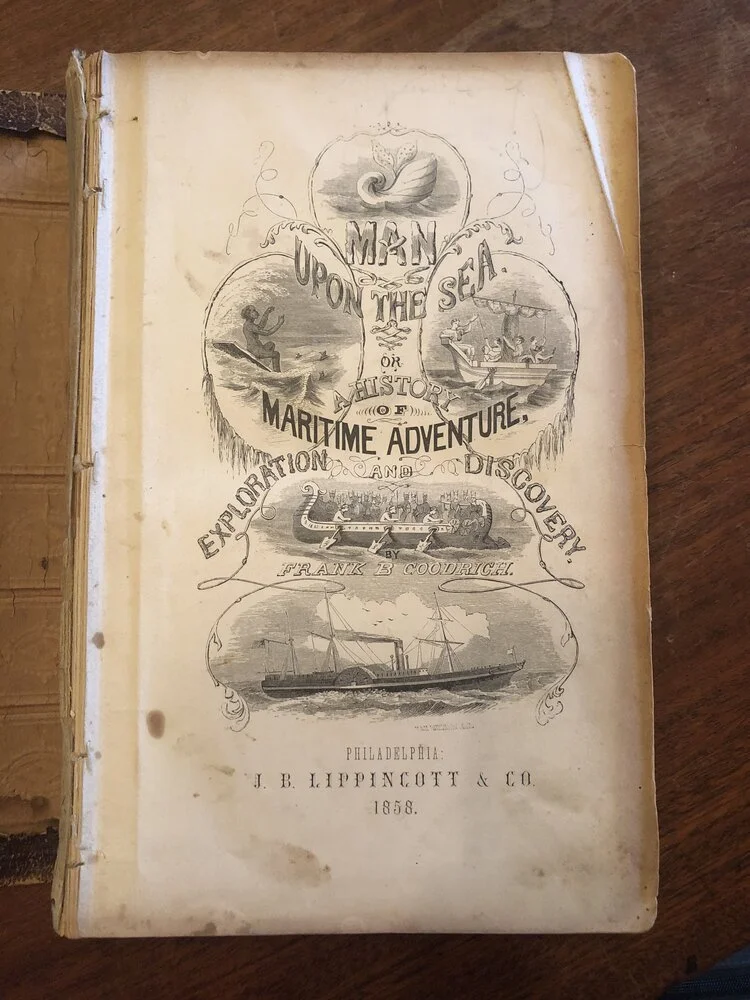The Mystery of "Poetry and Mystery of the Sea"
“What is there more sublime than the trackless, desert, all-surrounding, unfathomable sea?”
So begins “Poetry and Mystery of the Sea,” or “Grandeur of the Trackless Sea”—it depends on where you find it. At first, I wasn’t even sure who wrote it. Frank Goodrich’s 1858 travel history, Man Upon the Sea (Or A History of Maritime Adventure, Exploration and Discovery) simply says it is “Dr. Greenwood’s.”
Who is Dr. Greenwood? Didn’t say.
The piece also appears inThe Model Speaker (Consisting in Exercises in Prose and Poetry), an anthology, under the title “Grandeur of the Trackless Sea.” The author isn’t mentioned.
I’m getting ahead of myself. My real duty here is to introduce you to this mysterious Dr. Greenwood’s writing. Take a look, and hear the echoes of Thoreau, Emerson, Carson, and, most definitely, Muir.
“What is there more sublime than the trackless, desert, all-surrounding, unfathomable sea? What is there more peacefully sublime than the calm, gently-heaving, silent sea? What is there more terribly sublime than the angry, dashing, foaming sea? Power—resistless, overwhelming power—is its attribute and its expression, whether in the careless, conscious grandeur of its deep rest, of the wild tumult of its excited wrath. It is awful when its crested waves rise up to make a compact with the black clouds and the howling winds, and the thunder and the thunderbolt, and they sweep on, in the joy of their dread alliance, to do the Almighty’s bidding. And it is awful too, when it stretches its broad level out to meet in quiet union the bended sky, and show in the line of meeting the vast rotundity of the world.”
There is majesty in its wide expanse, separating and enclosing the great continents of the earth, occupying two-thirds of the whole surface of the globe, penetrating the land with its bays and secondary seas, and receiving the constantly-pouring tribute of every river, of every shore.
“There is majesty in its fulness, never diminishing and never increasing. There is majesty in its integrity—for its whole vast substance is uniform in its local unity, for there is but one ocean, and the inhabitants of any one maritime spot may visit the inhabitants of any other in the world. Its depth is sublime: who can sound it? Its strength is sublime: what fabric of man can resist it? It’s voice is sublime, whether in the prolonged song of its ripple or the stern music of its roar—whether it utters its hollow and melancholy tones within a labyrinth of wave-worn caves, or thunders at the base of some huge promontory, or beats against a toiling vessel’s sides, lulling the voyager to rest with the strains of its wild monotony, or dies away, with the calm and fading twilight, in gentle murmurs on some sheltered shore.
The sea possesses beauty in richness, of its own; it borrows it from earth, air, and heaven. The clouds lend it the various dyes of their wardrobe, and throw down upon it the broad masses of their shadows as they go sailing and sweeping by.
There is mystery in the sea. There is mystery in its depths. It is unfathomed, and, perhaps, unfathomable.
Back to my search. It was only when I Googled the full first line of the poem and scrolled a bit that I found it in—of all places—The Religious Examiner and Christian Miscellany, which lists the author as F.W.P. Greenwood.
Francis William Pitt Greenwood, (February 5, 1797- August 2, 1843), was a Unitarian minister from Boston, Massachusetts. He wrote for the Christian Examiner throughout the 1820s and 1830s, and was widely published in natural history publications as well. I can picture him sitting on the shores of Cape Cod, overwhelmed by what he saw.
“Who can tell, who shall know, how near its pits run down to the central core of the world? Who can tell what wells, what fountains, are there, to which the fountains of the earth are but drops? Who shall say whence the ocean derives those inexhaustible supplies of salt which so impregnate its waters that all the rivers of the earth, pouring into it from the time of the creation, have not been able to freshen them? What indescribed monsters, what unimaginable shapes, may be roving in the profoundest places of the sea, never seeking—and perhaps, from their nature, never able to seek—the upper waters and expose themselves to the gaze of man! What glittering riches, what heaps of gold, what stores of gems, there must be scattered in lavish profusion in the ocean’s lowest bed! What spoils from all climates, what works of art from all lands, have been engulfed by the insatiable and reckless waves! Who shall go down to examine and reclaim this uncounted and idle wealth? Who bears the keys of the deep?”


